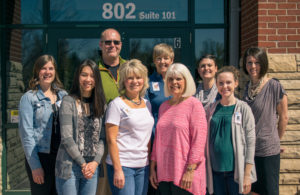Meditation, management and mindfulness are some of the interventions that researchers from Colorado State University’s Department of Human Development and Family studies have been implementing at the assisted-living facilities run by Columbine Health Systems in Fort Collins.
Benefits of mindfulness

The decision to move to an assisted-living situation can be a stressful process for all parties involved. Some older adults may not enjoy the idea of moving to an assisted-living situation, while their family members may feel remorse for placing their loved ones into the care of others. This can cause stress not only in older adults, but also in their friends and family as well.
Professor Douglas Coatsworth and Assistant Professor Gloria Luong are leading the study, which is funded by a grant from the Colorado Clinical and Translational Sciences Institute, a research center based at the University of Colorado Denver. Their goals are to look at the positive benefits of mindfulness to see if improvements can be made in the lives of the residents at Columbine Health Systems and those who closely associate with them.
“It‘s about experiencing the present moment, your thoughts, feelings and what is happening around you,” Coatsworth said. “Residents within the facilities run by Columbine Heath Systems participate in mindfulness classes as part of the study. Throughout the class’s duration, participants engage in an assortment of mindfulness-based activities such as meditation, deep breathing and movement-based exercises as a form of stress management.”
“Mindfulness is related to a lot of beneficial outcomes in terms of physical health as well as mental health and wellbeing,” Luong said. “Engaging in these kinds of strategies can help to reduce your levels of stress, and in turn you can see those effects in physiology.”
Measuring mindfulness
There are a multitude of methods to implement mindfulness. Some interventions are done solely in class under professional supervision to ensure the health and wellbeing of the participants. However, there are some activities that residents can do without supervision during their day-to-day schedules.
As a way to measure the effects of the mindfulness-based interventions, Coatsworth and Luong will look at both the physiological effects and self-reported attitudes of the older adults in the study. In order for them to measure the physiological aspects, participants wear a physical activity monitor similar to a FitBit.
These devices measure not only physical activity, but also their sleep-wake cycles. Through the data received from this monitor, Luong and Coatsworth are able to analyze how the participants are doing throughout the course of the day and see how they are reacting in times of high or low stress.
A systemic reform
 Mindfulness interventions are a recent but popular practice that many people utilize daily. However, current interventions and programs are often aimed at one particular group or individual. Luong and Coatsworth’s study seeks to take the idea of mindfulness a step further, by implementing mindfulness-based interventions not only for the participants, but also for their family members and friends.
Mindfulness interventions are a recent but popular practice that many people utilize daily. However, current interventions and programs are often aimed at one particular group or individual. Luong and Coatsworth’s study seeks to take the idea of mindfulness a step further, by implementing mindfulness-based interventions not only for the participants, but also for their family members and friends.
“We are looking at the program on multiple levels,” Luong said. “The whole is greater than the sum of its parts. We are hoping to see some interactive effects beyond the range of our participants. This can include their families, friends and loved ones. Our hope, should this prove to be a viable intervention, is to see this implemented in other settings as well.”
“Stress breeds stress,” Coatsworth added. “People feed off of one another naturally. But when stress is met with calm and collectiveness, it can reduce stress dramatically. What we hope to report is a calmer, more pleasant culture people want to live and engage in. If that happens, we can look to take this to different places.”
About Columbine Health Systems
Columbine Health Systems provides a continuum of care for older adults, including independent living, assisted living, home care, and rehabilitation. Their three campuses are located in Fort Collins, Loveland and Windsor, Colorado. Columbine has been an important partner for Colorado State University, supporting the Gerontology Interdisciplinary Minor, scholarships for gerontology students, internships, and also the Columbine Health Systems Center for Healthy Aging, a research center at CSU.
The Department of Human Development and Family Studies is part of CSU’s College of Health and Human Sciences.